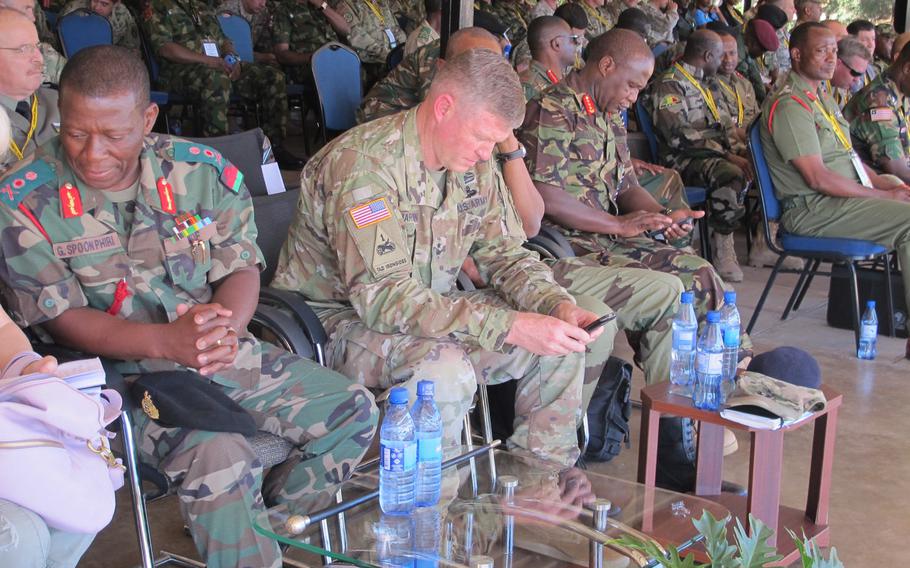
Maj. Gen. Joseph Harrington, commander of U.S. Army Africa, sits to the right of Malawi's defense forces chief Gen. Griffin Spoon Phiri at a peacekeeping demonstration in the Malawian capital during the African Land Forces summit on May 9, 2017. Next year's summit will be in Nigeria. (Nancy Montgomery/Stars and Stripes)
LILONGWE, Malawi — As the African Land Forces Summit ended recently in this southern African nation whose tiny military specializes in peacekeeping, plans were already being laid for next year’s meeting in a location at the center of some of the continent’s most pressing problems.
The sixth ALF summit will be in Nigeria, Africa’s most populous nation — despite persistent concerns over human rights violations by its military. Its military has been battling a vicious Islamist insurgency throughout this decade.
The choice to hold the next conference in West Africa’s economic powerhouse and hegemon was a considered one, said Maj. Gen. Joseph Harrington, commander of U.S. Army Africa, which sponsors the annual event.
“Frankly, it is in our national interest to partner with the Nigerian army in order to assist them as they strive to improve and professionalize, while fighting violent extremist organizations, to be the stable institution that the country and region needs,” he said.
That assessment was shared by many at the conference.
“I thought, ‘Oh, that makes sense,’” said a senior officer from an allied Western nation. “The bottom line is I think we are engaging with a country that has had some issues but with whom we think we can do good work,” said the officer, who declined to be identified because he wasn’t authorized to speak publicly. “I think we think they’re trying to do the right thing. And we’re giving them a shot at demonstrating that.”
The Nigerian military has been locked for years in a vicious battle with Boko Haram. The Islamist group has terrorized the country’s northeast, attacking army and police positions, carrying out suicide bombings, burning schools and abducting children.
But the Nigerian military has also been found to have engaged in serious human rights violations in its campaign to stamp out the insurgency.
Amnesty International said in a 2015 report that Nigeria’s forces had extrajudicially executed more than 1,200 people, had arbitrarily arrested at least 20,000 people and had committed countless acts of torture.
The U.S. State Department has confirmed abuses, saying in its 2016 human rights report that security forces “perpetrated extrajudicial killings and engaged in torture, rape, looting, and destruction of property,” either in response to Boko Haram attacks or “at times in response to crime and insecurity in general.”
The African Land Forces Summits, inaugurated by USARAF, in 2009 are widely seen as elevating the prestige of nations chosen to co-host the weeklong conference. That makes the Nigeria selection problematic, said Sarah Margon, the Washington director with Human Rights Watch.
“I’d say at this point, unless there are major changes, it’s premature. It’s a premature reward for insufficient reform,” Margon said. “The country is facing a very particular threat,” she said, “but at the same time you have decades of serious rights abuses.”
Having Nigeria co-host the event and lead discussions with other African military leaders could send the wrong message, she said, since “they haven’t been very effective in dealing with the threat (of Boko Haram) or disciplining their forces.”
U.S.-Nigeria relations soured under the country’s previous president, Goodluck Jonathan, and the Pentagon bypassed Nigeria in efforts against Boko Haram, working instead with neighboring Niger, Chad and Cameroon. But in 2015, after former Nigerian Army major general Muhammadu Buhari defeated Jonathan, promising to root out corruption and abuses, ties between the two militaries began to warm.
The Trump administration signaled in April it would is sell Nigeria up to 12 Super Tucano light-attack aircraft to support the fight against Boko Haram. A previous sale proposed by the Obama administration was stopped in January after a Nigerian fighter jet hunting for Boko Haram fighters accidentally bombed a camp for displaced people, killing dozens and wounding more.
The Amnesty International report concluded that acts committed by the Nigerian military “constitute war crimes for which military commanders bear both individual and command responsibility.” It named two army chiefs of staff and two chiefs of defense staff.
Asked about human rights concerns, Harrington said that all requirements under the so-called Leahy law, pushed through by Vermont Sen. Patrick Leahy in the late 1990s to prohibit U.S. support for military units and individuals connected to abuses, would be enforced. “We will absolutely ensure we follow all laws, rules and, frankly, common sense as we engage any of our partners,” he said.
In another sign of the expanding military-to-military relationship, U.S. Air Forces in Europe-Air Forces Africa last week co-hosted a meeting with African air chiefs in Botswana. The 7th annual African Air Chiefs Symposium, attended by 29 countries, focused on force development and recruitment and training issues, including cost sharing for a possible joint aviation training center.